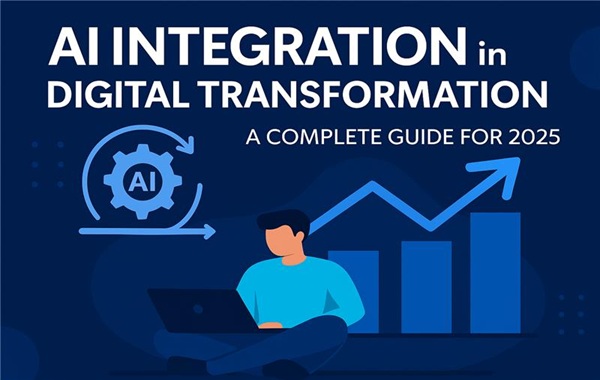AI Integration in Digital Transformation: A Complete Guide for 2025
In today's fast-paced business environment, the integration of Artificial Intelligence (AI) into digital transformation strategies is no longer optional; it's essential. As we move into 2025, organizations must embrace AI-powered digital transformation tools to remain competitive and relevant. This guide will explore the critical aspects of AI integration, offering insights and actionable strategies to help businesses navigate this transformative journey.

Table of Contents
1. Understanding Digital Transformation
2. The Role of AI in Business Evolution
3. Key Benefits of AI Integration
4. Assessing Readiness for AI Adoption
5. Developing an AI Adoption Roadmap
6. Cost-Effective AI Implementation Strategies
7. Overcoming Challenges in AI Integration
8. Best Practices for Successful AI Deployment
9. Measuring Success: Key Performance Indicators
10. Future Trends in AI and Digital Transformation
11. Conclusion: Embracing the AI Revolution
Understanding Digital Transformation
Digital transformation refers to the profound changes that organizations undergo to leverage digital technologies, enhancing their operations, customer experiences, and overall business models. It encompasses a wide range of initiatives, from adopting new technologies to rethinking processes and culture.
The Importance of Digital Transformation
-
Customer-Centric Approach: Modern consumers expect personalized experiences. Digital transformation enables businesses to meet these expectations through data-driven insights.
-
Operational Efficiency: Streamlining processes through automation reduces costs and enhances productivity.
-
Competitive Advantage: Organizations that embrace digital transformation can respond more swiftly to market changes, gaining an edge over competitors.
The Role of AI in Business Evolution
AI is a cornerstone of digital transformation, providing the tools necessary for organizations to innovate and thrive. By automating routine tasks and analyzing vast amounts of data, AI empowers businesses to make informed decisions and enhance their operational capabilities.
How AI Enhances Digital Transformation
-
Automation: AI automates repetitive tasks, freeing up human resources for more strategic initiatives.
-
Data Analysis: Machine learning algorithms analyze data patterns, enabling businesses to predict trends and customer behaviors.
-
Personalization: AI-driven tools create tailored experiences for customers, improving engagement and satisfaction.
Key Benefits of AI Integration
Integrating AI into digital transformation strategies offers numerous advantages that can significantly impact an organization's success.
Enhanced Decision-Making
AI processes large datasets quickly, providing insights that inform strategic decisions. This capability allows businesses to pivot and adapt to changing market conditions effectively.
Improved Customer Experience
AI-powered chatbots and recommendation systems enhance customer interactions, providing timely support and personalized suggestions that drive loyalty.
Increased Efficiency and Productivity
By automating mundane tasks, AI allows employees to focus on higher-value work, ultimately boosting overall productivity.
Assessing Readiness for AI Adoption
Before diving into AI integration, organizations must evaluate their readiness. This assessment involves examining data capabilities, technology infrastructure, and organizational culture.
Key Areas to Evaluate
1. Data Quality: Ensure that data is accurate, complete, and accessible.
2. Technology Infrastructure: Assess whether existing systems can support AI workloads.
3. Cultural Readiness: Foster an environment that embraces change and innovation.
Developing an AI Adoption Roadmap
Creating a structured AI adoption roadmap is crucial for successful integration. This roadmap should outline specific goals, timelines, and resources needed for implementation.
Steps to Create an Effective Roadmap
-
Define Objectives: Identify clear, measurable goals for AI integration.
-
Identify Use Cases: Focus on high-impact areas where AI can deliver immediate value.
-
Allocate Resources: Ensure that the necessary budget and personnel are in place for successful implementation.
Cost-Effective AI Implementation Strategies
Implementing AI doesn't have to break the bank. Organizations can adopt cost-effective strategies to maximize their investment.
Strategies for Budget-Friendly AI Integration
-
Leverage Open-Source Tools: Utilize free or low-cost AI tools to minimize expenses.
-
Start Small: Pilot AI initiatives in specific departments before scaling organization-wide.
-
Collaborate with Partners: Engage with technology partners to share resources and expertise.
Overcoming Challenges in AI Integration
While the benefits of AI integration are significant, organizations may face challenges during implementation. Identifying and addressing these challenges early can pave the way for smoother transitions.
Common Challenges and Solutions
-
Resistance to Change: Foster a culture of innovation through training and communication.
-
Data Privacy Concerns: Implement robust data governance frameworks to ensure compliance with regulations.
-
Skill Gaps: Invest in training programs to upskill employees in AI technologies.
Best Practices for Successful AI Deployment
To ensure a successful AI integration, organizations should adhere to best practices that promote effective deployment.
Key Best Practices
-
Engage Stakeholders: Involve key stakeholders in the planning and implementation process to secure buy-in.
-
Monitor Progress: Regularly assess the performance of AI initiatives against established KPIs.
-
Iterate and Improve: Use feedback to refine AI applications continuously.
Measuring Success: Key Performance Indicators
Establishing clear KPIs is essential for measuring the success of AI integration. These indicators should align with the organization's overall goals and objectives.
Suggested KPIs for AI Initiatives
-
Customer Satisfaction Scores: Measure the impact of AI on customer experiences.
-
Operational Efficiency Metrics: Track improvements in productivity and cost savings.
-
Return on Investment (ROI): Evaluate the financial benefits of AI initiatives against their costs.
Future Trends in AI and Digital Transformation
As we look ahead, several trends are shaping the future of AI and digital transformation. Organizations must stay informed to remain competitive.
Emerging Trends to Watch
-
Self-Learning AI: Future AI systems will continuously learn and adapt, enhancing their effectiveness.
-
AI in Edge Computing: Processing data closer to its source will improve response times and reduce latency.
-
Industry-Specific AI Solutions: Tailored AI applications will emerge, addressing the unique needs of various sectors.
Conclusion: Embracing the AI Revolution
The integration of AI into digital transformation strategies is not just a trend; it is a necessity for businesses aiming to thrive in the modern landscape. By understanding the role of AI, assessing readiness, and implementing effective strategies, organizations can unlock the full potential of AI-powered digital transformation tools. As we move into 2025, embracing this revolution will be key to achieving sustainable growth and success.
This article provides a comprehensive overview of AI integration in digital transformation, emphasizing the importance of strategic planning and execution. By following the insights and recommendations outlined here, businesses can navigate the complexities of AI adoption and position themselves for future success.







